Finding Affordable Used Guitars: A Pawn Shop Guide
Finding Affordable Used Guitars: A Pawn Shop Guide
Looking for affordable used guitars? Consider checking out pawn shops for quality instruments at wallet-friendly prices. Evaluate the guitar's condition, sound quality, and brand reputation. Inquire about warranty options and available payment plans. Remember to inspect for any damages, test the sound quality, and verify the guitar's history for authenticity. Consider negotiating the price by researching market trends and justifying your offer. Keep in mind factors like guitar condition, authenticity, and market value. For more tips on finding the perfect affordable used guitar, explore further into the ins and outs of pawn shop shopping for musical treasures.
Factors to Consider Before Buying
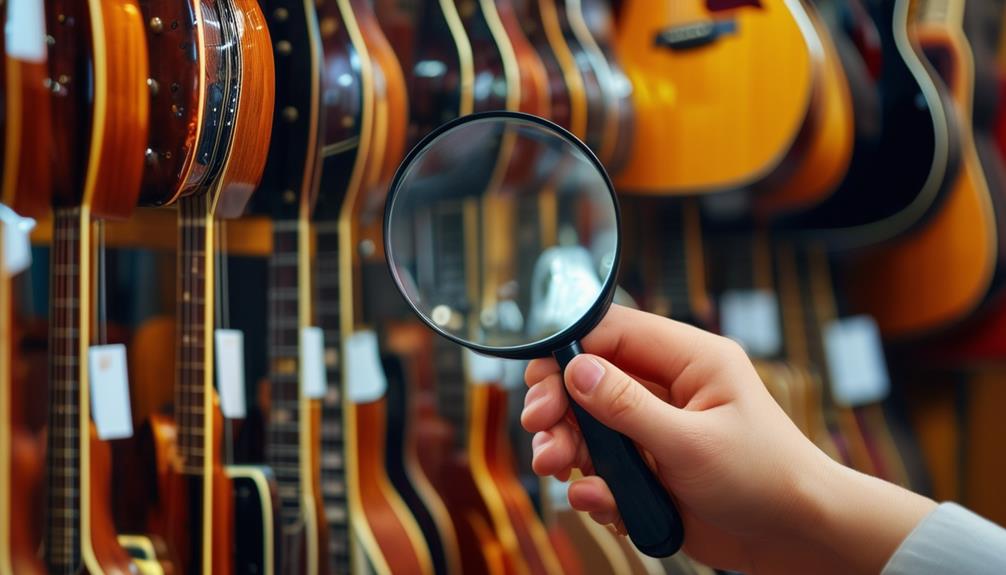
Before purchasing a used guitar from a pawn shop, it is essential to carefully evaluate its overall condition and sound quality. Budget considerations play a significant role in this decision-making process.
Additionally, brand reputation should not be overlooked, as reputable brands often guarantee better quality instruments. When buying from a pawn shop, it's advisable to inquire about warranty options. While used guitars may not come with a manufacturer's warranty, some pawn shops offer their own warranty policies for added peace of mind.
Also, check if the pawn shop provides any payment plans that can help you spread out the cost of the guitar over time. By considering these factors, you can make a more informed decision when purchasing a used guitar from a pawn shop.
Assessing Guitar Condition
When evaluating the condition of a used guitar, it's important to visually inspect the instrument for any signs of damage or wear. Checking for cracks in the body or neck is essential to guarantee the structural integrity of the guitar.
Additionally, testing the electronics functionality, such as pickups and knobs, will help determine if the guitar is in good working order.
Visual Inspection Tips
One effective way to assess the condition of a used guitar is by conducting a thorough visual inspection. Check for any finish flaws such as scratches, dents, or discoloration on the body, neck, and headstock.
Confirm the neck alignment is straight by sighting down the neck from the headstock to the body, looking for any twists or warping. Inspect the fretboard for wear and tear, particularly near the higher frets where most playing occurs.
Examine the tuning pegs to see if they are all intact and functioning properly. A visual inspection can reveal a lot about how well the guitar has been cared for and if there are any major issues that may affect its playability.
Checking for Cracks
To assess the condition of a used guitar thoroughly, it is important to carefully inspect for any cracks in the body, neck, or headstock. Cracks in these areas can greatly impact the sound quality and playability of the instrument.
When examining a guitar for cracks, pay close attention to the finish, as hairline cracks may not always be immediately visible. Repairing cracks can be costly, so it's vital to catch any damage early on.
Preventing damage is key to maintaining the value of the guitar. Avoid exposing the instrument to extreme temperatures and humidity levels, as these factors can contribute to the formation of cracks.
Testing Electronics Functionality
Testing the functionality of the electronics is essential when evaluating the condition of a used guitar. When evaluating a guitar, key aspects to take into account include testing tuning stability, checking fret wear, inspecting neck alignment, and evaluating intonation accuracy. Here is a breakdown of these important checks:
| Test | Description |
|---|---|
| Testing Tuning Stability | Confirm the guitar holds its tuning properly. |
| Checking Fret Wear | Examine the frets for signs of wear and tear. |
| Inspecting Neck Alignment | Verify the alignment of the neck for proper playability. |
| Evaluating Intonation Accuracy | Make sure that the guitar plays in tune across the neck. |
Negotiating the Best Price
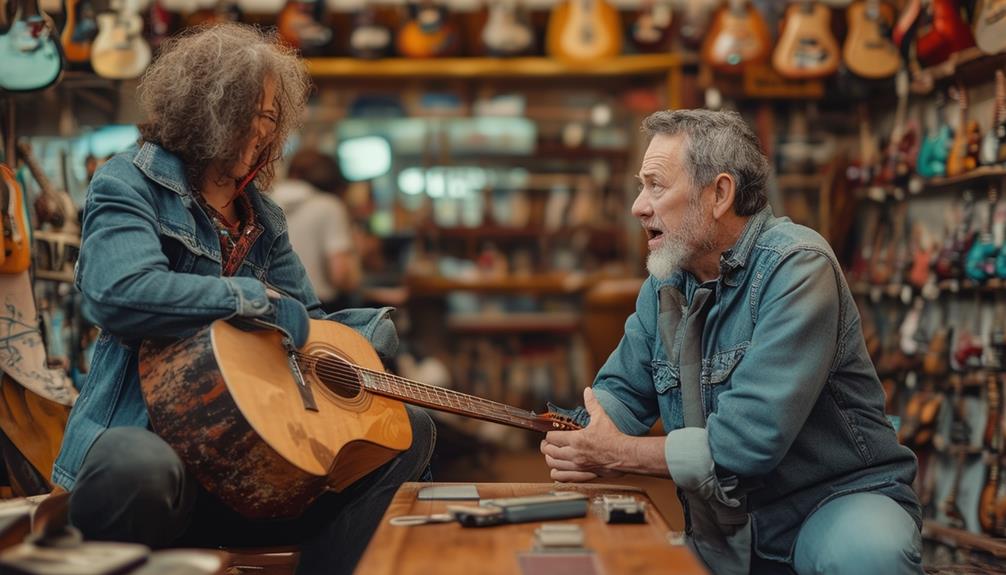
When negotiating the best price for a used guitar at a pawn shop, it's essential to have some price negotiation tips up your sleeve.
Understanding how to establish the fair value of the instrument can help you make a compelling case. Once you're armed with this knowledge, you'll be better equipped to close the deal successfully.
Price Negotiation Tips
Securing a favorable deal on a used guitar at a pawn shop involves adept bargaining skills and an understanding of market values. Communication skills and bargaining techniques play a pivotal role in negotiating the best price. It is imperative to remain polite, yet firm, while expressing your interest in the guitar.
Researching market trends and conducting price analysis beforehand can give you a competitive edge during negotiations. Be prepared to justify your offer by pointing out any imperfections or comparing prices of similar guitars.
Establishing Fair Value
To negotiate the best price for a used guitar at a pawn shop, it is important to accurately assess the fair value of the instrument based on market conditions and comparable listings. Fair pricing involves researching the current market value of similar guitars to establish a reasonable price range.
Consider factors like the brand, model, condition, and any additional accessories included with the guitar. Value assessment can be done by looking at online marketplaces, checking recent sales of similar guitars, and consulting with experienced musicians or guitar experts.
Closing the Deal
Negotiating the best price for a used guitar at a pawn shop requires clear communication and a strategic approach. When closing the deal, be prepared to discuss payment options and inquire about any warranty coverage the shop may offer.
Additionally, address shipping arrangements if applicable, ensuring the guitar reaches you safely. Furthermore, familiarize yourself with the pawn shop's return conditions in case the guitar doesn't meet your expectations.
Checking for Authenticity
When examining a used guitar at a pawn shop, the first step in determining its authenticity is to carefully inspect the instrument for any telltale signs of counterfeiting. The authentication process involves checking for details like the logo, serial number, and overall craftsmanship.
Identifying counterfeit guitars can be done by looking for inconsistencies in the branding, such as misspelled words or logos that are slightly different from the original. Additionally, examining the hardware, electronics, and finish of the guitar can also reveal clues about its authenticity.
It's important to be thorough in this inspection to make sure that you are purchasing a genuine instrument and not a fake replica.
Researching Market Prices
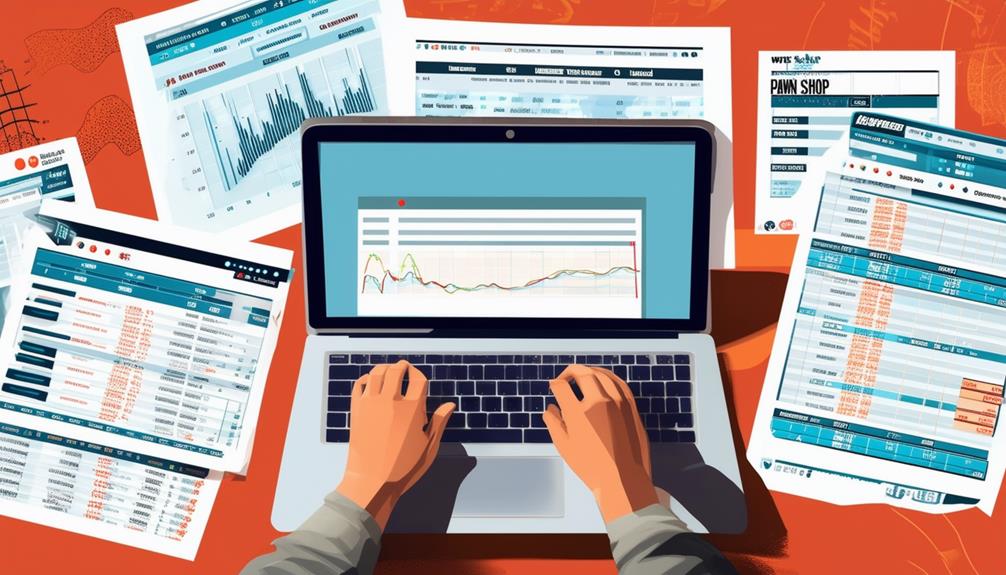
When looking to buy or sell a used guitar, understanding market prices is essential. Utilizing price comparison tips and online resources can help you gauge the current market value of the instrument you are interested in.
Researching market prices guarantees that you get a fair deal when transacting at a pawn shop.
Price Comparison Tips
To guarantee you are getting the best deal, it is essential to thoroughly research market prices when comparing used guitars at pawn shops. Start by evaluating brand reliability, as established brands often hold their value better.
Consider the popularity of the guitar model; more sought-after models may command higher prices. Check online marketplaces, music stores, and forums to gauge the average selling price for the specific brand and model you are interested in.
Keep in mind the condition of the guitar and any additional accessories included in the price. By conducting thorough research on brand reliability and guitar model popularity, you can make a well-informed decision when comparing prices at pawn shops.
Online Resources Used
Utilize online marketplaces and music forums to efficiently research market prices for used guitars when comparing prices at pawn shops. Online reviews and forums can provide valuable insights into the fair market value of specific guitar models. Additionally, these platforms can offer information on bargaining tactics and strategies to help you negotiate a better deal at a pawn shop. Below is a table illustrating how online resources can assist in determining the average prices for used guitars:
| Website | Pros | Cons |
|---|---|---|
| Reverb | – Wide selection of guitars | – Prices may vary |
| Guitar Center | – Trusted retailer | – Limited to specific brands/models |
| TalkBass Forums | – Community advice and recommendations | – Limited focus on bass guitars |
Understanding Return Policies
Understanding the return policies of pawn shops is essential for buyers of used guitars. When purchasing a used guitar, clarity on the return policy is vital. Some pawn shops may offer a limited window for returns, while others may have a strict no-return policy.
It is important to understand the timeframe within which returns are accepted and the condition the guitar should be in for a refund. Considerations for refund eligibility include factors such as whether the guitar can be returned in the same condition as when purchased and if any accessories or packaging need to be included.
Before finalizing a purchase, buyers should carefully review and understand the pawn shop's return policy to avoid any potential issues later on.
Inspecting for Damages
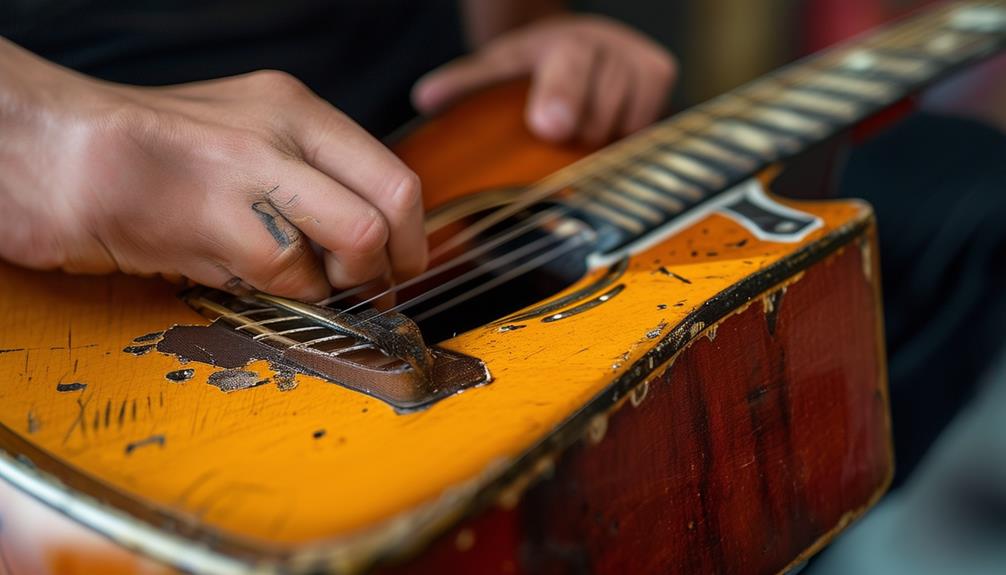
When examining used guitars at a pawn shop, a thorough inspection for damages is essential to guarantee the instrument's quality and value. To make sure you're making a worthwhile purchase, look out for the following:
- Refinishing options: Check for any signs of refinishing or touch-ups on the guitar's body, as this can impact its originality and value.
- Restoration techniques: Examine if the guitar has undergone any restoration work, as this could affect its sound quality and playability.
- Repair costs: Evaluate the potential repair costs for any damages found, and consider if these expenses align with your budget.
- Warranty options: Inquire about any warranty options provided by the pawn shop to safeguard your investment.
Testing Sound Quality
To assess the sound quality of a used guitar at a pawn shop, play various notes and chords across the fretboard to gauge its tonal characteristics. Sound testing involves plugging the guitar into an amplifier to compare the tones produced with different settings. Evaluate the overall tone quality of the instrument, considering factors like brightness, warmth, and sustain. Additionally, assess the playability of the guitar by checking the action, fret buzz, and intonation. A smooth-playing guitar will make it easier for you to create music comfortably. By combining tone evaluation with playability assessment, you can make an informed decision about the sound quality of the used guitar before making a purchase.
| Sound Testing | Amplifier Comparison | Tone Evaluation |
|---|---|---|
| Play various notes and chords | Compare tones with different settings | Assess brightness, warmth, and sustain |
| Check sound quality across fretboard | Evaluate sound projection | Consider tonal versatility |
| Assess resonance and sustain | Analyze distortion levels | Evaluate overall tone quality |
Verifying Guitar History
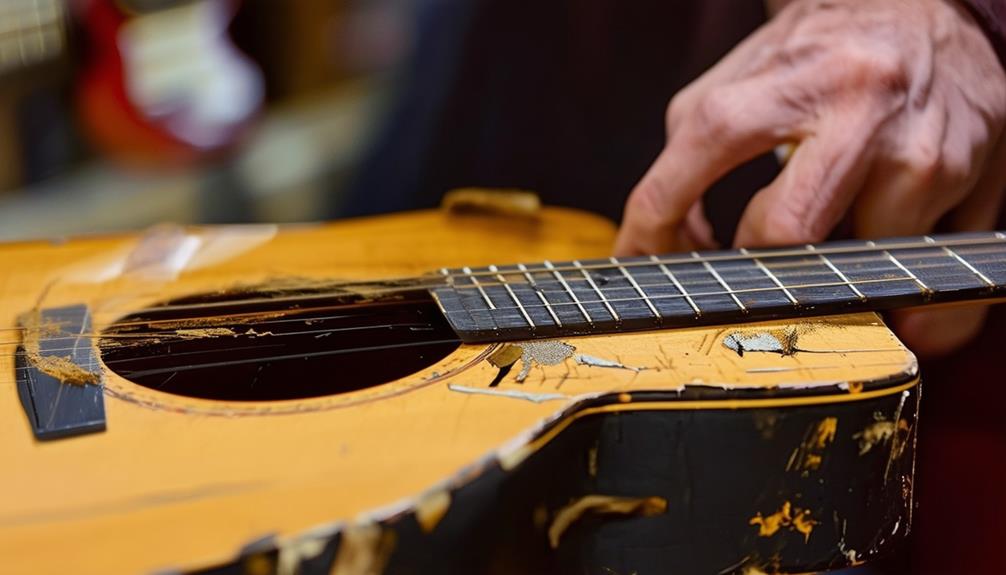
In evaluating a used guitar's background, it is crucial to confirm its history for authenticity and potential value. Here are some key steps to help you verify the guitar's history:
- Check the guitar manufacturer to confirm it matches the model and year claimed by the seller.
- Examine the serial number to determine the guitar's age, production location, and authenticity.
- Research online forums or databases specific to the guitar brand to cross-reference information and identify any discrepancies.
Securing a Good Deal
Securing a favorable deal for a used guitar at a pawn shop requires savvy negotiation skills and a thorough understanding of the instrument's worth. When bargaining, having a polite yet firm approach is crucial. Start by researching the guitar's market value and condition to negotiate from a knowledgeable standpoint.
Bargaining techniques like offering a lower price than your maximum budget can help leave room for negotiation. Requesting a guitar appraisal from a knowledgeable staff member can also provide insight into the instrument's quality and fair market value.
Additionally, keep an eye out for budget-friendly options that offer quality assurance, such as guitars with minor aesthetic flaws that do not affect playability. By utilizing these strategies, you can increase your chances of securing a good deal on a used guitar at a pawn shop.
Frequently Asked Questions
How Can I Tell if a Used Guitar Has Been Stolen?
When considering the authenticity of a used guitar, checking the serial number is essential. A missing or altered serial number can raise concerns about the instrument's history.
If you suspect a guitar may have been stolen, it is important to involve the police as handling stolen property carries legal implications.
Is It Possible to Negotiate Additional Accessories Along With the Guitar?
When purchasing a used guitar, negotiating for additional accessories is common practice in many stores. Some shops may include accessories like straps, picks, or cases as part of the deal.
It is important to inquire about any warranty options available for the guitar and accessories.
Negotiating can be a way to not only secure a better deal on the guitar itself but also enhance your overall playing experience with the inclusion of necessary accessories.
What Should I Do if I Suspect the Guitar Has Been Tampered With?
If you suspect a guitar has been tampered with, it is important to take steps to confirm its authenticity.
To begin with, carefully inspect the instrument for any signs of alterations or damage.
Next, seek expert advice from a reputable guitar technician or appraiser who can assess the guitar's condition and provide insights on any potential issues.
Taking these precautions will help you make an informed decision before purchasing a possibly compromised instrument.
Can I Return the Guitar if I Change My Mind After Purchase?
When considering the return policy for a purchased item, it's important to inquire about the seller's terms regarding buyer's remorse. Some establishments may offer refund options or a satisfaction guarantee for customers who change their mind post-purchase.
Understanding the return policy in advance can help make an informed decision and potentially avoid any dissatisfaction or complications with the purchase.
Are There Any Hidden Fees or Charges I Should Be Aware Of?
When considering purchasing a used guitar, it's crucial to inquire about potential hidden fees or charges that may accompany the transaction. Understanding the payment options available and the warranty coverage provided can help you make an informed decision.
Be sure to clarify any additional costs that may arise and review the warranty terms to make certain your investment is protected. Transparency in fees and thorough warranty coverage are key considerations when buying a used guitar.
Conclusion
To sum up, locating an affordable used guitar at a pawn shop calls for thoughtful evaluation of factors such as:
- Condition
- Price negotiation
- Authenticity
- Market value
- Damages
- Sound quality
- History
By following these steps, you can secure a good deal and rock out without breaking the bank.
So next time you're in the market for a guitar, remember to pawn wisely!

